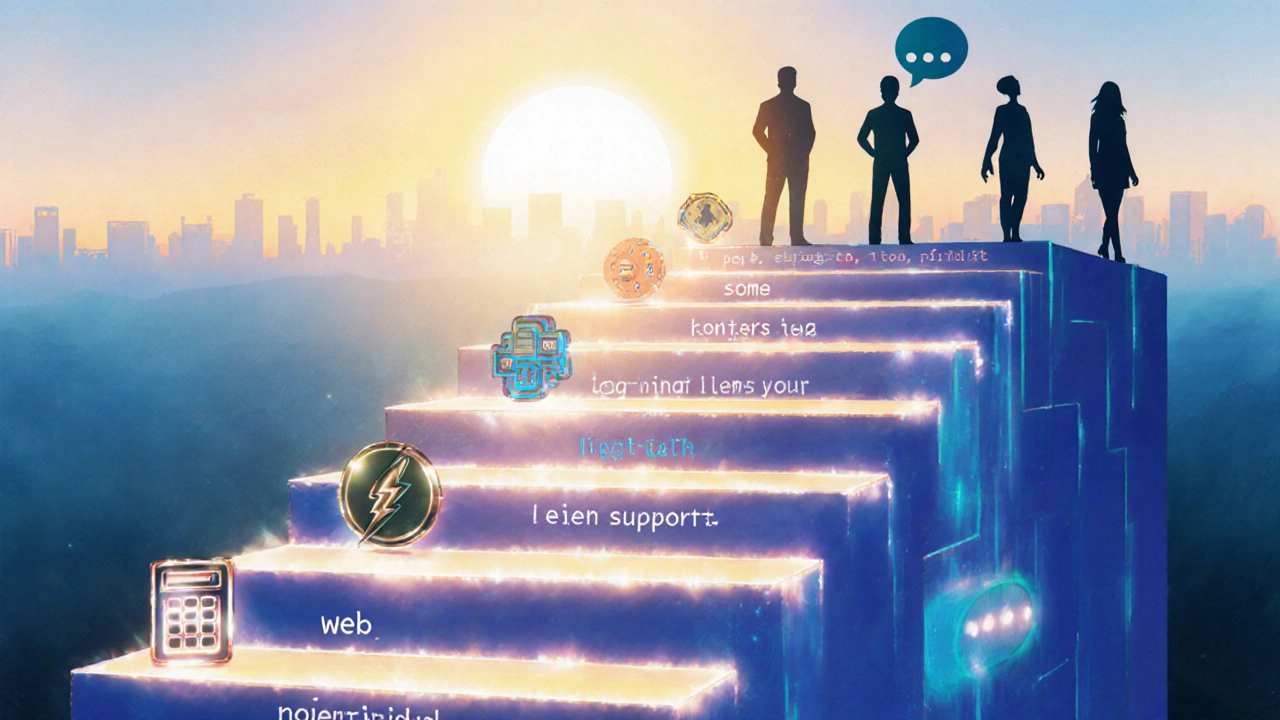Coding Domain Suitability Calculator
How Suitable Is Each Domain For You?
Answer 5 questions to discover which programming domains match your strengths and preferences. Based on the article's domain comparison.
Your Recommended Domains
Top Match:
Why this fits you:
Average difficulty:
Key strength:
Other Suitable Options:
When you hear someone ask, "Is coding a tough job?", you probably picture endless lines of code, cryptic error messages, and a constant battle with logic. The truth is a bit more nuanced. Coding can feel hard at times, but the difficulty level depends on what you expect, which tools you use, and how you approach learning. This article breaks down the real pain points, busts common myths, and hands you practical ways to make the journey smoother.
What Exactly Is Coding?
Coding is a process of writing instructions that a computer can understand and execute. These instructions, called programs or scripts, tell the machine how to manipulate data, interact with users, or control hardware. In everyday language, coding is the backbone of everything from mobile apps to web services, and even the software that runs a coffee machine.
Myths That Make Coding Seem Impossible
Before diving into the real challenges, let’s clear up a few myths that often scare newcomers away.
- Myth 1: You must be a math genius. While algorithms involve logic, most day‑to‑day coding relies on clear thinking rather than advanced calculus.
- Myth 2: You need to know every programming language. In reality, mastering one language well equips you to learn others quickly.
- Myth 3: You have to code 12‑hour days to become proficient. Consistent, focused practice beats marathon sessions.
These misconceptions inflate the perceived coding difficulty and can turn curiosity into surrender before you even start.
Core Challenges That Make Coding Feel Tough
Even after discarding the myths, most learners hit a few common roadblocks. Understanding them helps you tackle them head‑on.
- Problem‑solving: Writing code is essentially solving puzzles. If you’re new to breaking problems into smaller steps, the first few projects can feel overwhelming.
- Debugging: Error messages are cryptic, and finding the bug can be like looking for a needle in a haystack. Learning systematic debugging techniques is crucial.
- Syntax overload: Each language has its own set of rules. A missing semicolon or wrong indentation can cause a program to crash, making the learning curve seem steep.
- Abstract thinking: Concepts like recursion, inheritance, or asynchronous programming require you to think beyond concrete steps.
- Tooling fatigue: Integrated Development Environments (IDEs), version control systems, and package managers each have a learning curve of their own.
These challenges are normal, and most programmers experience them early on.
How Difficulty Varies Across Domains
Not all coding jobs are created equal. Some fields demand steep learning curves, while others are more beginner‑friendly. The table below gives a quick snapshot.
| Domain | Typical Learning Curve | Common Pain Points | Starter Language |
|---|---|---|---|
| Web Development | Low‑to‑Medium | HTML/CSS quirks, JavaScript async bugs | JavaScript |
| Data Science | Medium | Statistical concepts, data cleaning | Python |
| Mobile Apps | Medium‑to‑High | Device fragmentation, UI guidelines | Kotlin (Android) / Swift (iOS) |
| Embedded Systems | High | Hardware constraints, low‑level debugging | C |
The takeaway? Pick a domain whose learning curve matches your current comfort level. You can always jump to a higher‑difficulty field later.
Pro Tips to Lower the Perceived Difficulty
Once you know where the hurdles are, you can apply proven strategies to flatten them.
- Start with a clear, small project. Building a simple to‑do list app or a calculator gives you immediate wins and teaches the full development cycle.
- Use an IDE with built‑in linting. Tools like VSCode highlight syntax errors before you run the code.
- Adopt systematic debugging. Learn to read stack traces, insert console logs, and use breakpoints. Treat each bug as a learning opportunity.
- Break problems into functions. Write pseudocode first, then translate it line by line. This reduces the mental load of abstract thinking.
- Leverage community resources. Forums such as Stack Overflow, Discord coding channels, or local meetups provide quick answers and moral support.
- Schedule regular practice. Even 30 minutes a day beats sporadic 3‑hour marathons. Consistency builds muscle memory.
- Track progress. Keep a simple log of concepts mastered and bugs solved. Seeing growth boosts confidence.
Implementing these habits can turn a daunting learning curve into an approachable staircase.

When Coding Might Not Be the Right Fit
Honesty is key. Coding isn’t for everyone, and that’s perfectly fine. Consider these signs that another career path might suit you better:
- You dread problem‑solving and prefer routine, repetitive tasks.
- You get frustrated quickly with abstract concepts and lose motivation after a few bugs.
- You prefer direct human interaction over interacting with a computer screen.
If any of these resonate, explore roles that still benefit from tech awareness-like product management, UX design, or technical writing-where you can contribute without writing code daily.
Resources to Keep the Momentum Going
Learning to code is a marathon, not a sprint. Below are curated resources that cater to different learning styles.
- Interactive Platforms: freeCodeCamp, Codecademy, and LeetCode provide hands‑on exercises with instant feedback.
- Video Courses: YouTube channels like Traversy Media, CS50 (Harvard), and Udemy’s "Complete JavaScript" series walk you through real projects.
- Books: "Eloquent JavaScript" for web starters, "Automate the Boring Stuff with Python" for practical automation, and "The C Programming Language" for low‑level fundamentals.
- Community Groups: Meetup.com tech events, local hackathons, and online Discord servers where you can ask questions in real time.
Pick one resource that matches your learning style, set a weekly goal, and stick to it. The right tool plus discipline makes any coding challenge manageable.
Frequently Asked Questions
Is coding only for people with a computer science degree?
No. While a CS degree provides a solid foundation, many successful programmers are self‑taught or come from bootcamps, liberal arts, or even unrelated fields. The key is continuous practice and problem‑solving.
What age can someone start learning to code?
There’s no upper or lower age limit. Kids as young as 7 can start with visual tools like Scratch, while adults can begin with beginner‑friendly languages such as Python. Motivation matters more than age.
How long does it take to become job‑ready?
It varies. Intensive bootcamps aim for 3‑6 months of full‑time study, while part‑time learners might need 9‑12 months. Building a portfolio of real projects is the fastest way to prove competence.
Why do I get stuck on debugging for hours?
Debugging is a skill that improves with experience. Start by isolating the problematic code, use print statements or breakpoints, and read error messages carefully. Over time, you’ll spot patterns and solve bugs faster.
Can I earn a good salary without being a senior engineer?
Absolutely. Entry‑level positions in web development, QA automation, or support engineering often start around $70k-$90k in the US. Salary grows quickly with portfolio quality and specialization.
Answering the question "Is coding a tough job?" isn’t a simple yes or no. The perceived difficulty hinges on your background, the domain you choose, and the strategies you adopt. By understanding the real challenges, picking a suitable field, and using the right learning tactics, you can turn what feels like a steep hill into a climb you truly enjoy.







0 Comments